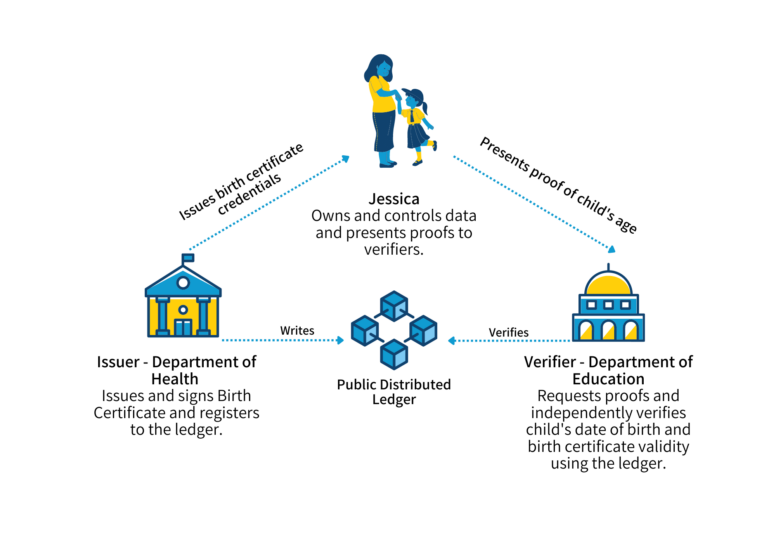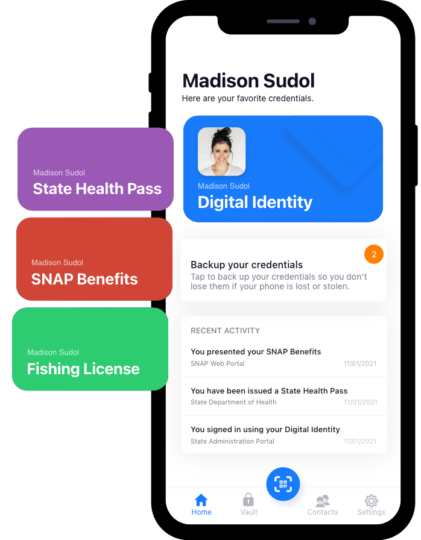5 Surprising Use Cases for Decentralized Identity
5 Surprising Use Cases for Decentralized Identity
It’s imperative for government agencies to be able to verify residents’ identities, as it helps ensure essential services are reaching the right people. And yet, the traditional approach for identity verification is manual, time-consuming, and redundant, requiring new paperwork for each interaction and leaving the entire process highly susceptible to fraud.
The good news: there is another way. With decentralized identity solutions, residents can store their identity information in a self-owned digital wallet. This approach has several benefits. Identities can be verified instantly via a distributed ledger. In turn, the agencies that request information do not retain it, making identity theft highly unlikely and leaving residents in complete control of their own data.
Decentralized identity solutions aren’t just some utopian dream for tomorrow, either. Already, government agencies are putting decentralized identity solutions into practice. In the state of Maryland, for instance, residents can apply for digital registration cards for medical marijuana. But the use cases don’t end there—and they extend beyond a digitally issued ID. Let’s take a look at five of them.
1. Vital records
Records like birth, death, and marriage certificates are, as their name implies, vital. US residents need these records for a variety of transactions throughout their lives. For example, a birth certificate is required to apply for a social security number, receive government benefits, get a passport, enroll in the military, and register your children for public school and sports programs. With existing approaches to identity management, using a vital record to verify personal information often means that a copy of the information is stored in dozens of agency databases, putting residents at risk for fraud. With decentralized identity, on the other hand, residents can verify the information included in vital records without sharing the information itself.
Let’s say a mother wants to enroll her child in kindergarten at the local public school. To do so, she must prove to the local school system that her child is old enough to register. The current online registration system requires her to upload a copy of her child’s birth certificate, putting her identifying information at risk.
 With Voyatek’s Decentralized Identity for Government (DIG) solution, she would use the Voyatek Digital Vault mobile app, to initiate a secure, end-to-end connection to transmit only the necessary data to complete the transaction. Her information is never stored on the public ledger. Without receiving or storing any of her personal information or contacting the Department of Vital Records, the school system can independently trust the validity of this information.
With Voyatek’s Decentralized Identity for Government (DIG) solution, she would use the Voyatek Digital Vault mobile app, to initiate a secure, end-to-end connection to transmit only the necessary data to complete the transaction. Her information is never stored on the public ledger. Without receiving or storing any of her personal information or contacting the Department of Vital Records, the school system can independently trust the validity of this information.
2. Health & nutrition assistance
 For programs that benefit families, applications can be arduous and take agencies weeks to process. Take the Supplemental Nutrition Assistance Program (SNAP). Applicants must fill out complex forms and provide details on the entire household, from dates of birth and incomes to assets such as bank accounts and expenses such as utilities. As Piyush Bhatnagar, vice president of security products and platforms at Voyatek, described it in an article for Security Boulevard, “the process is slow, costly, and frustrating.”
For programs that benefit families, applications can be arduous and take agencies weeks to process. Take the Supplemental Nutrition Assistance Program (SNAP). Applicants must fill out complex forms and provide details on the entire household, from dates of birth and incomes to assets such as bank accounts and expenses such as utilities. As Piyush Bhatnagar, vice president of security products and platforms at Voyatek, described it in an article for Security Boulevard, “the process is slow, costly, and frustrating.”
Additionally, individuals receiving SNAP benefits are often eligible for other government services, including Medicaid, Temporary Assistance for Needy Families (TANF), and the Children’s Health Insurance Program (CHIP). With traditional identity solutions, residents must manually submit the same information to each program, and each program must dedicate time and manpower to verifying the information.
With decentralized identity, the necessary validation can take place in minutes, instead of weeks. Once information is verified, it is stored in the resident’s digital wallet as a credential. That credential can then be shared with other agencies for expedient verification. Under this approach, residents can now access much needed assistance without delay, while also saving agencies time and resources.
3. Unemployment benefits
 When the pandemic first hit in 2020, unemployment rose to levels we hadn’t seen since the 1930s. Before individuals can begin to receive unemployment benefits, they must demonstrate their work has been terminated. Similar to health and nutrition benefits applications, this process can be cumbersome, requiring someone already experiencing tremendous stress to jump through numerous hoops. Using the traditional process, an agency might then spend days or weeks processing a single application for unemployment benefits. When agencies can instead quickly validate resident requests through distributed ledgers, it directly improves the lives of residents.
When the pandemic first hit in 2020, unemployment rose to levels we hadn’t seen since the 1930s. Before individuals can begin to receive unemployment benefits, they must demonstrate their work has been terminated. Similar to health and nutrition benefits applications, this process can be cumbersome, requiring someone already experiencing tremendous stress to jump through numerous hoops. Using the traditional process, an agency might then spend days or weeks processing a single application for unemployment benefits. When agencies can instead quickly validate resident requests through distributed ledgers, it directly improves the lives of residents.
At a time where trust in government is low and approximately 80% of Americans feel that they can’t control how their data is used by public institutions or private companies, decentralized identify gives residents control over their data and helps build back trust in government.
4. Business services
Speaking of trust in government, it’s impossible to ignore the fact that cyberattacks targeted at government systems are on the rise. The city of Oakland, for instance, was recently a victim of a cyberattack that temporarily shut down its permits and licensing portals. Here is where decentralized identity can help: When business permits and licensing, and other government services, are handled in a decentralized manner, cybersecurity is improved along with efficiency. Because no unnecessary data is stored in a single (or centralized) agency-managed location, a decentralized approach leaves government institutions a less attractive target for hackers.
5. Fraud detection in higher education
Another common target for hackers is higher education institutions, which house large amounts of student data. With a decentralized approach, the institution once again does not store the data, leaving students in full control of their personal information.
Decentralized identity solutions, like Voyatek’s decentralized identity solution for higher education, can also protect against fraud. Many colleges and universities are seeing a surge in applications submitted under stolen or fabricated identities by fraudsters targeting financial aid funds. In 2021, California’s community colleges received 65,000 fraudulent loan applications, spurring the U.S. Department of Education to issue a nationwide warning.
With a decentralized identity approach that begins during the admissions process and continues through the financial aid application, students’ information is validated via a public ledger and shared through tamper-proof communication channels, making application or financial aid fraud nearly impossible.
The bottom line is that decentralized identity comes with many benefits, all of which can be realized today. Individuals can securely carry everything they need for verification in a digital wallet, while maintaining complete control over access. Meanwhile, institutions can strengthen security, reduce the risk of fraud, and deliver a more seamless digital experience. If you’re interested in learning more about decentralized identity solutions, contact Voyatek now.

